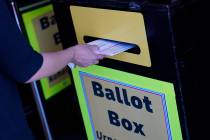A chance to prove guilt or innocence
William Osborne of Alaska was convicted, along with another man, in the rape and assault of a prostitute outside Anchorage in 1993. He was identified by his co-defendant, and the victim also pointed to him as one of her attackers. One lab test on a semen sample included him as a possible suspect, but his lawyer decided against having the sample subjected to more sophisticated DNA testing.
A decade after his conviction, Osborne admitted to the crime in a parole hearing. After he was released, he was sent back to prison for a robbery, indicating he's hardly anyone's angel.
But because parole boards often require acknowledgement of a crime as a sign of penitence and a condition for release, statements such as Osborne's "confession" are not truly non-coerced. And the convict has continued to insist that a modern DNA test of a condom found at the crime scene will show he was not guilty of the 1993 rape.
In 44 states, prisoners can file petitions to obtain new DNA tests of evidence on file, so long as the test can prove they are innocent or guilty. Congress passed a similar law for federal prisoners. Since the advent of DNA testing, at least 232 prisoners have been freed after lab results showed they did not commit the crime that put them behind bars.
But Alaska, Alabama, Massachusetts, Mississippi, Oklahoma and South Dakota do not have laws that allow new DNA tests for convicted prisoners.
Monday, the U.S. Supreme Court heard arguments in Osborne's case, asking the justices to rule for the first time whether the constitutional guarantee of due process gives convicts -- as well as those who are presumed innocent -- a right to seek test evidence that could show they are innocent.
Last year, the 9th U.S. Circuit Court of Appeals ruled for him, holding, "Osborne's right to due process of law prohibits the state from denying him reasonable access to biological evidence for the purpose of further DNA testing."
On Monday, lawyers for Alaska -- and for the Obama administration -- asked the court to reject that plea, holding that prisoners have no legal right to old evidence, particularly when they could have sought the testing before their trial.
The pragmatic arguments focus on incentives -- perverse or otherwise. If a defense lawyer believes DNA evidence will only make things worse for a client, can he or she be required to seek and present that evidence? Isn't that like violating a defendant's right to remain silent?
On the other hand, if such evidence exists but is not presented, couldn't that merely fuel schemes to set up additional "grounds for appeal"?
But there's really no need to wander far down that rabbit trail. The goal of justice should be to get things right. States deserve wide latitude to do things their own way, but if convicts in 44 states and the federal system have a right to see evidence that could exonerate them, why should that right disappear due to mere geographic accident for defendants in the six remaining states?
Neither cost nor convenience nor the passage of time should trump the right of that one innocent soul in a cell block of 100 to prove his innocence. Even if he's no angel.























